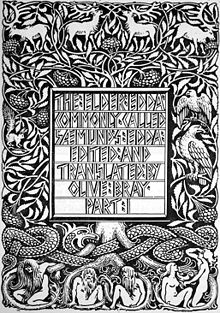Poetic Edda
collection of Old Norse poems
The Poetic Edda is the modern name for an untitled collection of Old Norse anonymous narrative poems in alliterative verse. It is distinct from the closely related Prose Edda, although both works are seminal to the study of Old Norse poetry. Several versions of the Poetic Edda exist: especially notable is the medieval Icelandic manuscript Codex Regius, which contains 31 poems.

Quotes
editshields are splintered.
Wind-time, wolf-time,
ere the world falls.
- Ek man jǫtna ár of borna,
þás forðum mik fœdda hǫfðu;
níu mank hęima, níu ívíði,
mjǫtvið mæran fyr mold neðan.Ár vas alda þars Ymir byggði,
vasa sandr né sær, né svalar unnir;
jǫrð fansk æva né upphiminn;
gap vas ginnunga, ęn gras hvęrgi.- I remember yet the giants of yore,
Who gave me bread in the days gone by;
Nine worlds I knew, the nine in the tree
With mighty roots beneath the mold.Of old was the age when Ymir lived;
Sea nor cool waves nor sand there were;
Earth had not been, nor heaven above,
But a yawning gap, and grass nowhere. - Völuspá, 2–3, as translated by H. A. Bellows (1923)
- I remember yet the giants of yore,
- Brœðr muno beriaz ok at bǫnomverða,
muno systrungar sifiom spilla.
Hart er í heimi, hórdómr mikill.
Skeggǫld, skálmǫld, skildir ro klofnir.
Vindǫld, vargǫld, áðr verǫld steypiz.
Mun engi maðr ǫðrom þyrma.- Brothers shall fight and fell each other,
and sisters' sons shall kinship stain.
Hard is it on earth, with rampant whoredom;
Axe-time, sword-time, shields are splintered.
Wind-time, wolf-time, ere the world falls.
Nor ever shall men each other spare. - Völuspá, 45, as translated by H. A. Bellows (1923)
- Brothers shall fight and fell each other,
- Eldr er beztr með ýta sonum
ok sólar sýn, heilyndi sitt,
ef maðr hafa náir, án við löst at lifa.- Fire for men is the fairest gift,
And power to see the sun;
Health as well, if a man may have it,
And a life not stained with sin. - Hávamál, 68, as translated by H. A. Bellows (1923)
- Fire for men is the fairest gift,